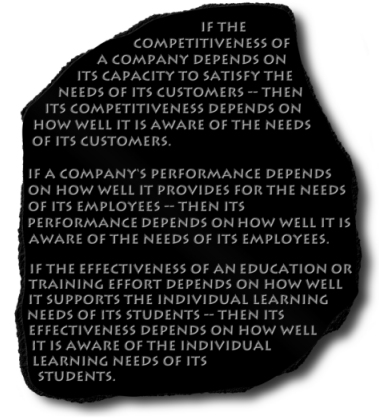 Note: The following post was initially published on the blog of the National Association of School Superintendents.
Note: The following post was initially published on the blog of the National Association of School Superintendents.
“The only sustainable advantage of any human system (business, non-profit, government, school system…) is how well it adapts – how well it learns (1). How well a human system learns depends on how well its leader(s) lead the learning of the people involved. First and foremost, good leaders are leaders of learning.”
The key to improving reading scores (or any other student performance issue in your schools) is to create a professional learning community within which your educators develop a common vocabulary and a shared set of mental models and use them to continually learn together to teach reading (or whatever it is) better. Buying the ‘right’ program and training teachers to use it is not only insufficient, it misorients a school system’s learning.
In a recent keynote to the Georgia School Superintendents Association, I reviewed the poor (statistically insignificant to ambiguous) progress of the US DOE’s “Struggling Readers Grant” program. I went on to make the case that a big part of the problem was that teachers were ‘trained to implement’ reading programs without having a sufficiently granular, shared understanding of ‘what’s at stake’ and ‘what’s involved’ in learning to read. Absent sufficient “1st person understanding”, teachers: 1) don’t have the correct mental models to learn from their students’ responses and adaptively differentiate their instruction, 2) don’t have the shared understanding and vocabulary they need to learn together as a community.
WHAT OUR KNOWLEDGE TELLS US TO SEE
As the “Struggling Readers Grant” effort is focused on middle school students, we deconstructed the unique challenges faced by struggling readers in middle school. Surprising to many, I showed that the main impediment to their progress is no longer the cognitive linguistic challenges they faced in earlier grades (though they remain). Now, having learned to be unsuccessful for many years, the main impediments to their progress are:
2) Maladaptive mental models and habits that misguide their learning.
If teachers don’t recognize these impediments (student’s emotional aversions and misorienting mental models and habits), how can they differentiate instruction towards helping their students learn free of them? Without the mental models (learning lenses) needed to understand what their learners actually need, they can only default to probabilistic models that will hit and miss according to abstract statistics. My point is that attempts to improve instruction are only as good as the mental models of the teachers involved in them. A teacher’s mental models must adequately represent the challenges his or her learners are actually experiencing. Understanding a student’s learning challenges is an entirely different basis for differentiating instruction than following abstract ‘steps of instruction’.
Effective instruction depends on teachers learning to differentiate their instruction and modulate their teaching in a way that is learning-stretch-relevant (mentally-emotionally) to the actual students being instructed. It depends on teachers having mental models that enable them to understand, 1st person, the challenges involved in learning (whatever is being instructed), as well mental models for ‘reading’ what their learners have learned in the past (mentally-emotionally), that is impeding their current progress.
If your teachers aren’t learning to be better at this, why not?
If you’ve created a professional learning community similar to what I am describing, please share what you’re doing with me. If you think the path to improving student outcomes is training teachers to implement instructional practices regardless of their 1st person understanding, please help me understand why you think that.
#1 – for a business example, see: “Learning: The Only Sustainable Advantage“

No comments yet.